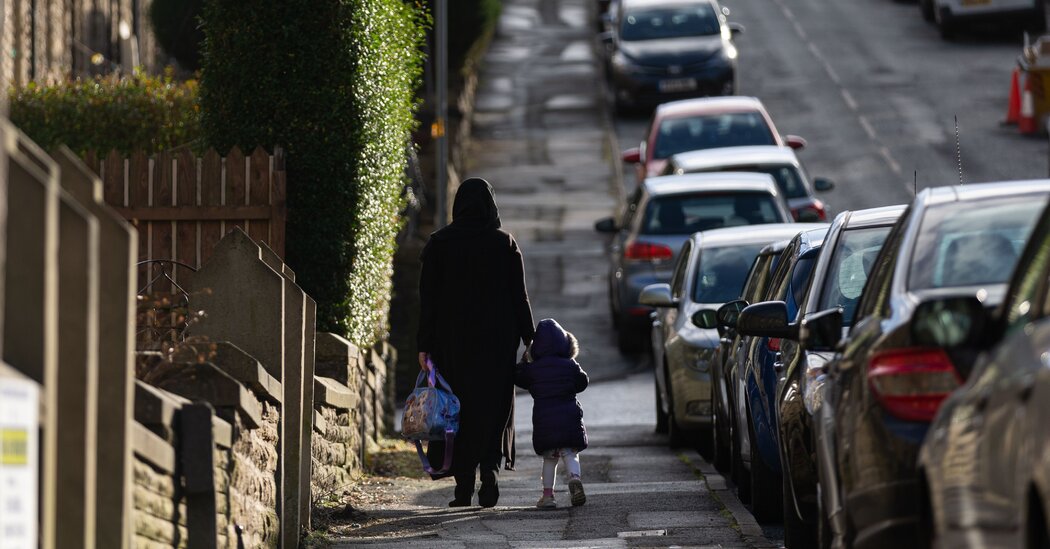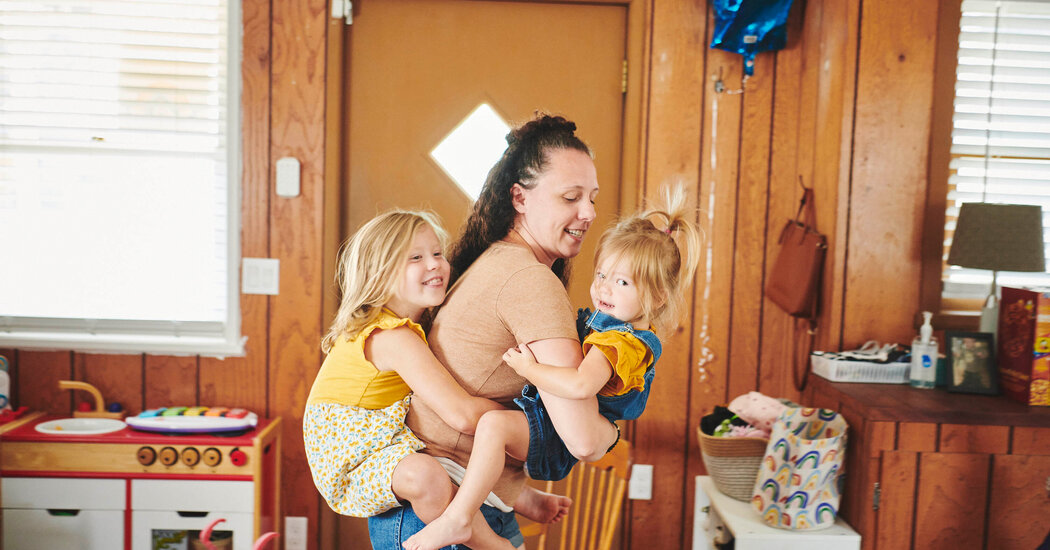The rise of the Delta variant and the uncertainty over schools and child care are keeping these parents from applying for jobs.Brianna McCain left her job as an office manager when the pandemic started, to care for her two young daughters. By last spring, she was ready to go back to work. But she hasn’t been able to, because her children are still at home.She has been searching for a job with flexible hours and the ability to work from home, but these are hard to find, especially for new hires and for hourly workers. She can’t take an in-person job until school opens for her 6-year-old, and her district, in Portland, Ore., has not announced its plans. She also needs child care for her 2-year-old that costs less than she earns, but child care availability is far below prepandemic levels, and prices have increased to cover the costs of Covid safety measures.“When you’re getting into a new job especially, there isn’t flexibility,” said Ms. McCain, whose partner, a warehouse worker, cannot work from home. “And with the unknowns of Covid, I don’t know if my kid’s going to get pulled out of school for a quarantine or school’s going to stop.”Especially as the Delta variant spreads, many parents of young children — those under 12 who cannot yet be vaccinated — say they’re unable to return to workplaces or apply for new jobs as long as there is uncertainty about when their children can safely return to full-time school or child care.Companies have been struggling to hire and retain workers for other reasons, too, and many parents have had no choice but to work. (In a recent Census Bureau survey, 5 percent of parents said their children were not currently attending child care for pandemic-related reasons.) But for the group of parents who still have children at home — they’re disproportionately Black and Latino, and some have medically vulnerable family members — it’s a significant challenge.“You cannot divorce the child care issue and the pandemic,” said AnnElizabeth Konkel, an economist at the Indeed Hiring Lab. “It’s important that we don’t forget about the workers who are wrestling with this day in and day out.”In an Indeed survey this summer, one-third of those looking for a job said they wouldn’t want to start in the next month, and a significant share said they were waiting for schools to open. Among those who were unemployed but not urgently looking, nearly one-fifth said care responsibilities were the reason. Those without college degrees were more likely to cite such a reason — and more likely to be unable to work from home or to afford nannies.Summer is always a challenge for working parents, and this year that is especially true. To meet safety guidelines, many camps have opened with shorter schedules and fewer children. Others have shut down because of the hiring shortage. And many parents don’t feel comfortable sending their children because of the risk of Covid exposure.Fall is looking increasingly uncertain. Some workplaces have paused reopening plans because of Delta, and parents worry schools may follow. Certain companies, including McDonald’s, and states, like Illinois, are trying to get ahead of this by offering child care benefits to help parents get back to work. According to Bright Horizons, the employer-based child care company, 75 companies have started offering backup child care this calendar year and others, like PayPal, have extended their pandemic expanded benefits through this year.Parents also have questions about whether in-person school is still safe. Children have been at much lower risk of serious disease from Covid, and schools were not a major source of transmission last year. Scientists and doctors have said they should open, despite Delta. But there is not solid data on whether Delta affects children differently, and some schools have dropped mask mandates and distancing. Vaccines for children under 12 are expected by late fall or early winter, if all goes as planned.Ms. McCain said uncertainty about child care this fall is keeping her home: “I don’t know if my kid’s going to get pulled out of school for a quarantine or school’s going to stop.”Leah Nash for The New York TimesMost school districts are still saying they plan to open full time, without the shortened schedules many had last spring. And the five largest nationally have released reopening plans, according to the Center on Reinventing Public Education at the University of Washington, which has been tracking districts’ responses to the pandemic. But some plans are still sparse on details, and districts where union negotiations are still taking place have not been able to answer all of parents’ questions.“What we’ve been most surprised by this summer is the lack of publicly available clarity on what to expect,” said Bree Dusseault, who leads the data effort. “Families need to know so they can structure their lives.”Even parents in districts that have already announced reopening plans face uncertainty. Will there be child care before and after school, and extracurricular activities? Will families need to quarantine for two weeks when there are cases at schools? Could schools close again if cases continue to rise?For Alexis Lohse, a mother of two in St. Paul, Minn., Delta feels like one detour too many. She lived in poverty as a single mother. In her 30s, she went to college, the first in her family to do so, and earned a master’s degree. She got a job in state government, and just before the pandemic she had a chance at a long-awaited promotion.But when schools closed, she could not pursue it. She kept working, but put aside all advancement opportunities and reduced her hours. (Her husband, a letter carrier, couldn’t.) Now, her county is identified by the C.D.C. as at substantial risk level, and with school set to open right after large gatherings at the Minnesota State Fair, she’s skeptical that full-time school will happen.“I don’t know how I get back on track, especially with the questions out there — how schools reopen; when; variants; the way everybody else is behaving; having the schools open and close at bizarre random hours,” she said.She says the safety net she built for herself has been torn away: “I know how difficult it is and how lacking in infrastructure our country is in supporting parents. And it just feels so frustrating that the same brick walls I hit 16 years ago, I hit again in the pandemic.”Many parents of preschool-aged children face a shortage of child care openings. One-third of child care centers never reopened, research shows; those that are still closed disproportionately served Asian, Latino and Black families. Those that opened are operating at 70 percent capacity, on average. They have struggled to hire qualified teachers; must keep classes small to limit exposure to the virus; and have raised prices to cover new health and cleaning measures.Daphne Muller, a mother of two in Los Angeles and a consultant to tech companies, said she calls preschools almost every week to find out if there is room for her youngest: “I don’t feel like I can plan anything career-wise for myself. I don’t want to take a job and have to quit.”Parents must also plan for disruptions, like quarantine periods after exposures or when community case rates rise.Bee Thorp, a mother of two in Richmond, Va., said her children’s child care center closed three times last year for two weeks each, and also shortened its hours for cleaning. Her husband, a lawyer, had much less flexibility than she did, so the extra care fell to her.“What that has meant is me not really job searching,” she said. “I can’t ask in an interview: ‘Do you mind if I take off two weeks with no notice?’ It’s frustrating to hear comments about how people aren’t applying for jobs. Maybe people do want those jobs; they just can’t right now.”Other parents aren’t yet ready to send their unvaccinated children to school. Amy Kolev is a mother of three and a construction project manager in Glen Burnie, Md. When virtual school became too hard, she and her husband, a software programmer, decided she would quit. She is yearning to return, but won’t risk exposing her children.“I’m going to go back when my kids are vaccinated and not a day before,” she said.
Read more →



